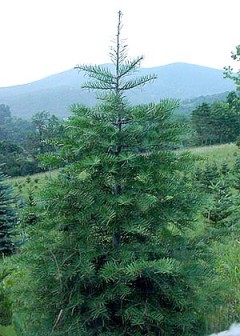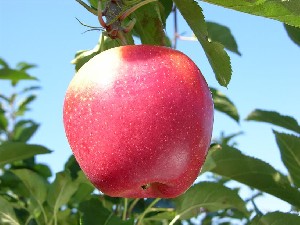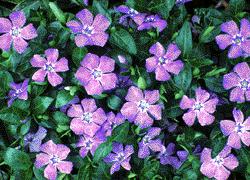Conservation
District
Programs
Award Winners
Chesapeake Bay Program
Dirt & Gravel Roads
Envirothon
Erosion Control (Ch 102)
Golf Tournament
Nutrient Management Program
Tree Sale
Watershed Program
District Directors
District Staff
Directions to Office
Resources & Services
Forms
Links
Frequently Asked Questions
District Home Page
Conservation District
310 Allen Road, Suite 301
Carlisle, PA 17013-9101
717-240-7812
Fax 717-240-7813
[email protected]
41st Annual Tree Seedling Sale
2018
NEW! - Tree orders are no longer being accepted. If you did not place an order, some extra trees will be available the first pick up day at the Conservation District office on a first come first serve basis.
We will be selling a limited amount of planting bars for $25 each.
Tree sale pick up dates for 2018:
Thursday April 19 from 1pm-5pm Friday April 20 from 8am-2pm Conservation District Office
Thank you.
Each year the Conservation District holds a tree seedling sale to raise funds for our
environmental education projects. The seedlings include evergreens, hardwoods, fruit trees and some
ornamental trees. Most seedlings come packaged in bundles of 10 and range in size from 8 - 36 inches.
The district also sells groundcover, flowering bulbs and wildflower seed mix.
We also sell tree shelters and stakes, and Bluebird boxes.
Below are links to the items that are available this year:
If you would like to be added to the tree sale mailing list please email your mailing address to us.
[email protected]
Trees
Groundcover
Wildflower Mix
Bulb Packages List of Frequently Asked Questions
|
CANAAN FIR Similarities to both Fraser and Balsam Fir in growth and appearance. Attractive medium-sized tree generally reaching 40-55 feet in height and 20-25 feet in diameter. Ability to tolerate poorly drained, heavy soils. |
|
WHITE PINE Should reach 6 feet in 6-7 years starting with three year seedling. Will grow to 100 feet. A five needle pine, soft,light green blue four inch needles. Good for windbreak or hedge. Dry or poorly drained soils. Full sun. |
|
|
CONCOLOR FIR Also known as White Fir. Should reach 6 feet in 8-9 years with a three year seedling. Grows to 120 feet. Silver truck and soft silver foliage. One of the best Christmas trees. Holds needles best of any short needled tree. Needs good drainage. |
|
|
SCARLET MAPLE Grows to 50-60 ft. developing a round head of green leaves with silver undercolor. Silver-gray bark with leaves turning brilliant crimson in fall. Grows well in all soil types. |
|
|
WHITE OAK Grows 50 to 80 feet in height and as wide. Grows best in a deep, loamy, well drained soil. The most prolific lumber oak in the Northern Hemisphere. A good tolerance of highway salt. Wetland species. Broad, round, dense head, spreading branches and purple-red fall color. |
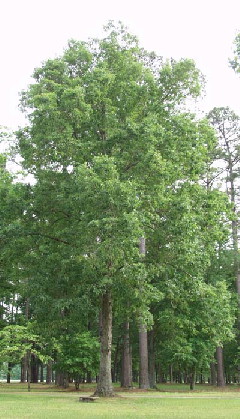
|
|
RED OAK Fast-growing oak, maturing with a broad round head, leaves turn a red to reddish-brown in Autumn. Will tolerate a wide range of soil types from acid to alkaline. Mature height 75 to 80 feet. |
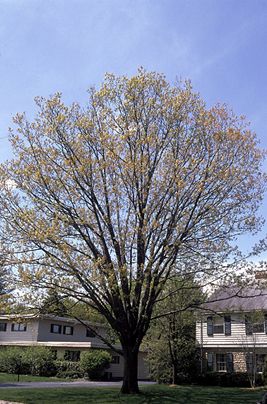 |
|
PEAR TREE PACK Pack includes one each: |
|
|
APPLE TREE PACK Pack includes one each: |
|
|
RED HAVEN PEACH This variety is considered by many as the standard for the Northeast peach industry. Tree is vigorous, very bud-hardy and productive. Fruit is medium-sized and colors to a brilliant red. One of the best commercial varieties. Ripens around August 1 in south-central Pennsylvania. |
GROUNDCOVER
|
MYRTLE (PERIWINKLE) (2.25" peat pots - 50 per flat) An excellent groundcover for both sun and shade; a short evergreen perennial groundcover that matures at about 6" tall and 3' in diameter for each plant. Performs best in rich, evenly moist, well drained soils in partial shade, but is adaptable to soils of average fertility. Blue-purple blooming in late March and April but numerous times throughout the growing season. |
|
SHOWY NORTHEAST NATIVE WILDFLOWER MIX WITH NATIVE GRASSES
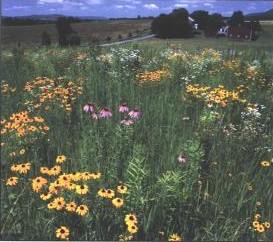
Planting instructions:
It is recommended to mix four (4) parts of sand or soil with one (1) part of seed. This will help to evenly spread the seed. After spreading the seed over the bare ground, lightly rake the seed into the soil. A thin layer of straw or hay mulch can also be used after seeding is completed.
BULB PACKAGES AVAILABLE THIS YEAR
 D - Freesia Mix (annual)
D - Freesia Mix (annual)
Guaranteed to delight! Elegantly formed fragrant flowers in an array of brilliant colors that can be planted
indoors or out. A favorite of florists!
Height: 12" - 18";
Bloom: June - July

I - Stargazer Lilies (2 bulbs) perennial
Strikingly beautiful blooms of fuschia color, dramatic shape and pleasing fragrance. Hardy growth,
excellent cut flowers!
Height: 25-30"; Bloom: July-September
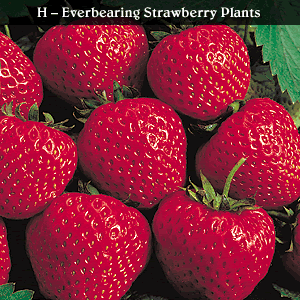
H - Everbearing Strawberry Plants
(10 plants) perennial, likes sun
The best available virus-free plants! Large, red, juicy berries throughout summer.
Height: 10" ; Bloom: spring and summer before fruit
N - Peacock Orchids (annual, likes sun)
Hold on to summer with this sweet-scented late bloomer! Elegant, creamy white 4" flowers accented with
prominent purple centers on sturdy stems.
Height: 24"-36" ; Bloom: July-October
FAQ-Frequently Asked Questions
Following is a list of questions and answers about our tree sale. This page is for informational purposes only and does not guarantee survival of any plantings. If your question is not addressed on this list, please call or
email the Conservation District for assistance. Thank you.Q.How should I plant my trees?
A.Dig a hole deep enough to make sure roots extend downward and do not form a "J". Make sure the hole is deep enough to cover all roots. Pack soil firmly around the roots. Keep watered. If possible, keep weeds and grass from growing to high or thick, blocking the sunlight from the tree.
Q.How do I care for the seedlings if I am not going to plant them right away?
A.The trees should be "Healed in". Dig a small hole or trench, tamp the seedlings in the ground, keep watered.
Q.What are tree shelters?
A.A tree shelter is a biodegradeable polypropelene tube that surrounds your hardwood seedlings and protects them from deer, rabbits, rodents, herbicides, mowers and weed trimmers. Tree shelters create a greenhouse environment that encourages seedling growth. Not recommended for evergreens. See picture.


